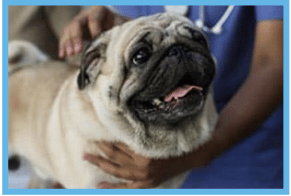Brachycephalic Obstructive Airway Syndrome (BOAS)
What is it, and what are the symptoms?
Brachycephalic obstructive airway syndrome (BOAS is a condition affecting short nosed breeds of dogs and cats (particularly Pugs, French Bulldogs and British Bulldogs), causing difficulty in passing air through the nose and throat. Symptoms of this disease include loud breathing (snoring, even when awake), difficulty catching breath, regurgitation (usually of white foam, or food), difficulty in exercising and even episodes of fainting.
What is the problem?
The two main problems are small nostrils and an overly long soft palate. The nostrils form a major contribution to airway resistance and small nostrils have significant effects on the pressures of breathing. The long palate acts as a physical barrier to breathing, as it blocks the entrance to the rest of the airway (the larynx). As the palate vibrates, it becomes swollen and thickened, causing further blockage of the airway. Unfortunately, if dogs with BOAS are not treated, they develop secondary problems, including collapse of the larynx (the cartilages of the throat become weaker and become yet another obstruction for air flow).
Investigation and surgery
A member of our surgical team will discuss your pet’s history and symptoms to decide a tailor-made diagnostic plan. This will include a full assessment of the mouth and upper airways, but can also include X-rays, a CT-scan, and sometimes a camera up the nose or into the wind-pipe. Once a full assessment has been made, surgery is customized to your pet’s individual needs. This can include widening the nostrils, laser removal of extra tissue within the nasal sinuses, shortening the soft palate, removal of the tonsils, and removal of any extra folds of tissue within the larynx.
Why have I been referred?
Treatment for BOAS requires expert care to ensure the safety of your pet, and airway surgery carries greater risks when compared to other surgery. Paragon Referrals can offer state of the art diagnostic tests to ensure the correct surgery is performed to give your pet the best possible outcome. Our experienced surgeons can discuss with you how badly your dog is affected, and therefore the level of surgery that will be required. Our hospital is staffed 24h per day with vets and nurses, who can assist your pet’s recovery from surgery and anaesthesia. In addition, if your pet has a poor recovery from anaesthesia, we are staffed to offer one-on-one level of care in our dedicated ICU.
Prognosis?
Most dogs and cats recover very well from the procedure and are either discharged the same day or the next day. Most owners describe their pets to be happier, more willing to exercise, and enjoy a better quality of life. The overall prognosis usually depends on how badly affected your pet was before surgery, so it is better not to delay. Sadly, some dogs are so badly affected that their prognosis is poor.
Concurrent disease
Dogs affected with BOAS often have other concurrent disease. Among others, these can include chronic eye ulcers, secondary to bulging eyes (see department of ophthalmology), allergic and chronic skin disease (see department of dermatology) and chronic regurgitation (see department of internal medicine). Where possible, we are happy to combine appointments to maximise efficiency and minimise your pet’s hospital stay.

